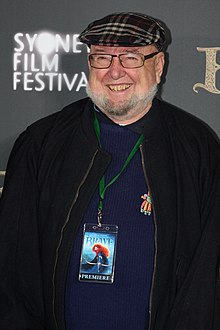Thomas Keneally
Australian novelist
Thomas Michael Keneally AO (born 7 October 1935) is an Australian, novelist playwright, and essayist. His best-known work, Schindler's Ark, won the Booker Prize and was adapted as the film Schindler's List directed by Steven Spielberg.

Quotes
edit- Peter Thompson: Was one of the things that really attracted you to the story, the obvious moral ambiguity of Schindler?
Tom Keneally: Absolutely, it was the fact that you couldn't say where opportunism ended and altruism began. And I like the subversive fact that the spirit breatheth where it will. That is that good will emerged from the most unlikely places.- Interview on Talking Heads (archived). ABC (30 July 2007).
Schindler's Ark (1982)
edit- From 1993 onwards, the book has been published under the title Schindler's List.
- Fatal human malice is the staple of narrators, original sin the mother-fluid of historians. But it is a risky enterprise to have to write of virtue.
- Prologue
- In times like these, he said, it must be hard for the churches to go on telling people that their Heavenly Father cared about the death of even a single sparrow. He'd hate to be a priest, Herr Schindler said, in an era like this, when life did not have the value of a packet of cigarettes. Stern agreed but suggested, in the spirit of the discussion, that the Biblical reference Herr Schindler had made could be summed up by a Talmudic verse which said that he who saves the life of one man, saves the entire world.
- Ch. 2
- The references are to Matthew 10:29 (or Luke 12:6) and Sanhedrin 4:9:1 of the Jerusalem Talmud.
- The more Orthodox of the ghetto had a slogan—"An hour of life is still life."
- Ch. 16
- The list is an absolute good. The list is life. All round its cramped margins lies the gulf.
- Ch. 31
- In those uneasy two days, between the declaration of peace and its accomplishment, one of the prisoners, a jeweler named Licht, had been making a present for Oskar, something more expressive than the metal stud box he'd been given on his birthday. Licht was working with a rare quantity of gold. … Licht melted the gold down and by noon on May 8 was engraving an inscription on the inner circle in Hebrew. It was a Talmudic verse which Stern had quoted to Oskar in the front office of Buchheister's in October 1939. "He who saves a single life saves the world entire."
- Ch. 37
- Cf. Sanhedrin 4:9:1 of the Jerusalem Talmud. In the movie, this is rendered as: "Whoever saves one life, saves the world entire."